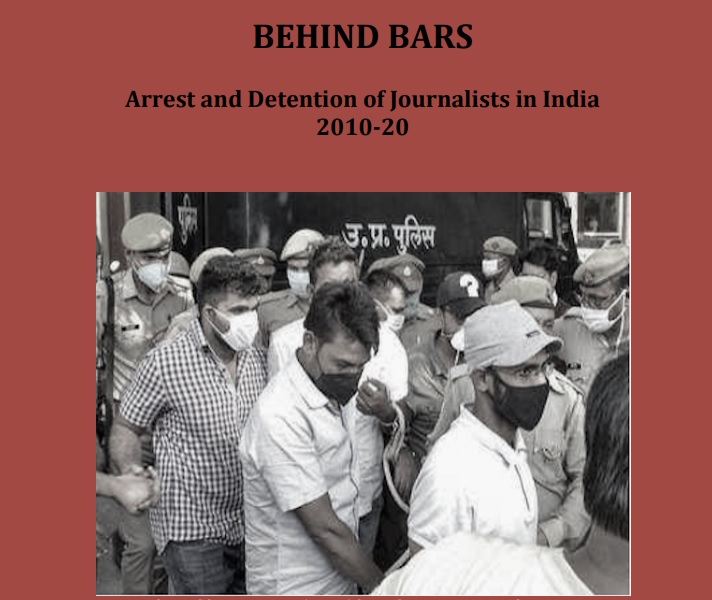
Free Speech Collective, a group comprising journalists, lawyers and activists, that aims to protect the right to freedom of expression and to vigorously promote free speech and the right to dissent in India has released its report titled Behind Bars that looks at the arrest and detention of journalists in India between 2010 and 2020. The report finds, “A sharp rise in criminal cases lodged against journalists in India for their work, with a majority of cases in BJP-ruled states, has contributed to the deterioration in the climate for free speech in India.”
The report highlights shocking statistics to back its claims, “In the last decade, 154 journalists in India were arrested, detained, interrogated or served show cause notices for their professional work and a little over 40 per cent of these instances were in 2020. Nine foreign journalists faced deportation, arrest and interrogations or were denied entry into India.”
Shedding light on who has launched this war on journalism, the report says, “Seventy-three of the 154 cases documented in this study have been reported from BJP-ruled states. Another 30 cases were reported from states ruled by BJP and its National Democratic Alliance (NDA). Of the cases in BJP-ruled states, Uttar Pradesh led the pack with 29 cases. Other instances are from states under President’s Rule or Governor’s rule, directly under the control of the Union government.”
The report also finds, “Apart from cases under various sections of the Indian Penal Code (IPC), ‘terror’ related charges and sedition have also been increasingly applied against journalists.” Moreover, “Politicians and corporate houses have filed criminal defamation cases seeking damages in crores and SLAPP suits while there are gags on media coverage of sensitive cases.”
Hostile and dismissive attitude of the government
Illustrating the government’s role in enabling a culture of hostility towards journalism, the report says, “India’s ranking has been slipping steadily in various national and international indices on safety of journalists, freedom of expression and human rights. At the beginning of the year, India’s Union Minister for Information and Broadcasting Minister Prakash Jawadekar debunked ratings by international organisations and announced the setting up of a review by senior Indian journalists.”
It gives the example of what transpired at the beginning of the ill-conceived lockdown in wake of the Covid-19 pandemic, “The hostile and dismissive attitude of the government towards independent media reportage and the criminalising of journalists for their reports were nowhere more marked than in the first few months of the lockdown announced by the Union government in March 2020. An advisory was issued by the Union Ministry of Electronics and Information Technology (MeiTY) on March 20, 2020, to all social media platforms to ‘inform users not to host, display, upload, modify, publish, transmit, update or share any information that may affect public order and unlawful in any way.’ A meeting between Prime Minister Narendra Modi and select media owners to ensure positive articles about the pandemic followed this on March 24.”
Propaganda and demonisation of Muslims
The report notes, “The end of the decade has also marked the rise of a highly polarized and partisan media. Blatantly fuelling false and inciting news coverage, this — mainly broadcast — media indulged in propaganda, demonisation of Muslims and peddled false information.”
It quoted a report by the Campaign Against Hate that pointed out that the “demonisation of Muslims in the case of the Tablighi Jamaat cluster was in continuation with media’s characterisation of the anti-CAA protestors as anti-nationals. In both cases, the message from sections of the media was that these individuals and communities were not entitled to full constitutional rights.”
UAPA, Sedition and other serious charges
The report says, “Journalists have been arrested and face court cases on ‘terror’ and ‘conspiracy’ charges under sections in the Unlawful Activities (Prevention) Act, 1967 (UAPA), Official Secrets Act (OSA), sedition, spreading communal disharmony, trespass, cheating, criminal conspiracy in the Indian Penal Code (IPC), 1860, obscenity under the Information Technology Act, 2000, the Disaster Management Act, 2005, the Epidemic Diseases Act, 1897 and prohibitory orders under Sec 144 of the Criminal Procedure Code, 1973.”
It gives examples of journalists languishing behind bars, “Two journalists –Aasif Sultan of the Kashmir Narrator and Siddique Kappan of Azhimukham – are still in custody on charges under the UAPA while a third, Prashant Rahi, has been convicted and sentenced to life imprisonment. On June 25, 2019, Ghulam Jeelani Qadri, journalist and publisher of the Urdu-language newspaper Daily Afaaq from Srinagar, Jammu and Kashmir, was arrested on charges under the now lapsed Terrorist and Disruptive Activities (Prevention) Act, 1985!”
States leading the charge against journalists
The report finds that Uttar Pradesh rules the roost with a total of 29 cases against journalists in the 2010-2020 period, followed by Chhattisgarh (17), Jammu and Kashmir (16), Tamil Nadu (15), with Delhi and Maharashtra tied for the fifth spot with 10 cases each.
The entire report may be read here:
Related:
Uttar Pradesh: Photographer who clicked farmer being hit by police ‘attacked, beaten’
Kashmir journalist assaulted, harassed by Cyber Police, for article on cyberbullying
Indian journalists decry attack on freedom of press amidst Covid-19
End harassment of Kashmiri journalists, lawyers: Kashmir Reading Room